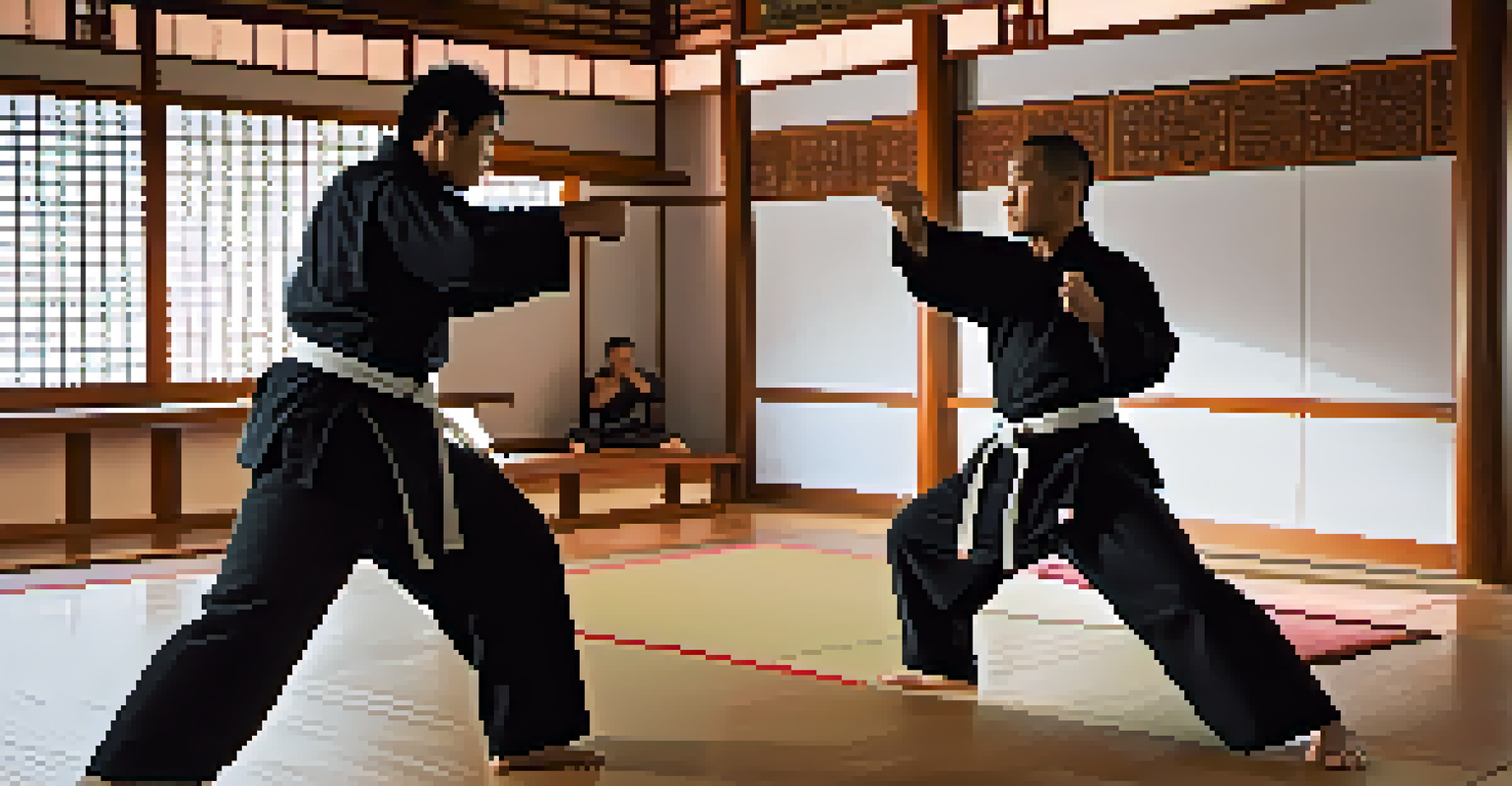Understanding Emotional Regulation for Self Defense Success

What is Emotional Regulation in Self Defense?
Emotional regulation refers to the ability to manage and respond to your emotions appropriately. In self-defense situations, this skill can be crucial. When faced with danger, a calm and controlled mindset can mean the difference between acting effectively or freezing under pressure.
It's not the load that breaks you down, it's the way you carry it.
Understanding emotional regulation helps you recognize your feelings and their impact on your reactions. For example, if you feel fear, acknowledging it allows you to channel that emotion into a focused response rather than succumbing to panic. This awareness is foundational for anyone looking to enhance their self-defense skills.
Moreover, emotional regulation isn't just about suppressing feelings; it's about understanding and processing them. By practicing techniques like mindfulness, you can build resilience and better manage your emotional responses, leading to improved decision-making in critical situations.
The Importance of Calmness in Emergencies
In any self-defense scenario, maintaining a sense of calm can significantly improve your chances of success. When adrenaline kicks in, it can cloud judgment and lead to rash decisions. Cultivating calmness helps you think clearly and assess the situation objectively.

Consider the common saying, 'Think before you act'. This advice is particularly relevant in self-defense. A calm demeanor allows you to evaluate your options, whether that means escaping, de-escalating, or defending yourself effectively.
Emotional Regulation is Crucial
Managing emotions effectively can significantly impact your response in self-defense situations.
To enhance your calmness, practice breathing techniques or grounding exercises. These strategies can help center your mind, making it easier to stay composed when faced with threats. In turn, this poise can lead to better outcomes during confrontations.
Recognizing Triggers for Emotional Responses
Understanding what triggers your emotional responses is key to effective self-regulation. Everyone has unique triggers—situations that provoke strong reactions. By identifying these triggers, you can prepare yourself to handle them better when they arise.
In the midst of chaos, there is also opportunity.
For instance, if you notice that loud noises make you anxious, you can practice techniques to manage that anxiety before it escalates. Familiarity with your reactions will empower you to respond thoughtfully instead of reacting impulsively.
Keeping a journal or reflecting on past experiences can help uncover these triggers. This self-awareness is essential, as it allows you to develop coping strategies tailored to your emotional landscape, ultimately enhancing your self-defense readiness.
Techniques for Enhancing Emotional Regulation
There are several techniques you can employ to improve your emotional regulation skills. Mindfulness meditation, for example, encourages you to observe your thoughts and feelings without judgment, fostering greater emotional awareness. This practice can be invaluable in tense situations.
Another effective method is cognitive restructuring, which involves challenging negative thoughts and replacing them with more balanced perspectives. By reframing your thoughts, you can reduce anxiety and approach self-defense scenarios with a clearer mind.
Calmness Enhances Decision-Making
Staying calm during emergencies allows for clearer judgment and better assessment of options.
Additionally, engaging in regular physical exercise can help regulate your emotions by releasing endorphins. This boosts your mood and equips you with a stronger mindset, making it easier to face potential threats with confidence.
The Role of Empathy in Self Defense Situations
Empathy, the ability to understand and share the feelings of others, plays a crucial role in self-defense. While it may seem counterintuitive, being empathetic can help you gauge the intentions of others and respond appropriately. This insight can lead to de-escalation rather than confrontation.
For example, if you can sense that someone is acting out of fear or desperation, you may choose to diffuse the situation with compassion instead of aggression. This approach not only prioritizes your safety but also reflects a deeper understanding of human behavior.
Practicing empathy in everyday interactions can sharpen this skill. By actively listening and trying to understand others' perspectives, you build a foundation that can serve you well in high-stress situations.
Building Resilience Through Emotional Training
Resilience is the capacity to recover quickly from difficulties, and it's a vital aspect of emotional regulation. In self-defense, resilience allows you to bounce back from setbacks and maintain your composure under pressure. Training your mind to be resilient can significantly enhance your self-defense effectiveness.
One way to build resilience is through exposure to controlled stressors, such as simulated self-defense scenarios. These practice sessions can help you develop coping strategies and reduce the likelihood of being overwhelmed in real situations.
Empathy Aids in Conflict Resolution
Understanding others' emotions can help de-escalate potentially dangerous situations.
Additionally, cultivating a growth mindset—believing that you can improve through effort—can bolster your resilience. This perspective encourages you to view challenges as opportunities for growth, making you more adaptable when faced with real-life threats.
How Emotional Regulation Influences Decision Making
Emotional regulation directly affects your decision-making abilities, especially in high-stress environments. When emotions run high, it can be challenging to think logically and make sound decisions. By managing your emotions, you can approach situations with a clearer head.
For example, if you can maintain emotional control when confronted with an aggressor, you’ll be better equipped to weigh your options. This might mean deciding whether to escape, negotiate, or defend yourself, rather than acting on impulse.

Practicing emotional regulation techniques can sharpen your decision-making skills over time. By making a habit of evaluating your emotions and their influence, you’ll find it easier to make informed choices in the heat of the moment.